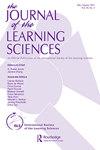反应性与智力劳动:与学生成绩相关的数学课堂话语特征
IF 3.9
1区 教育学
Q1 EDUCATION & EDUCATIONAL RESEARCH
引用次数: 6
摘要
摘要背景:本研究考察了教师和学生每时每刻的数学话语以及这些话语与学生学习的关系。我专注于对学生数学思维的反应性的话语结构和教师和学生话语中的智力工作。对学生数学思维的响应是一个人承认、引出、接受或建立学生即时思维的程度。智力工作反映了说话者在给定的谈话回合中启动或执行的认知工作。方法:我开发了分析框架,解释了七年级数学课堂上不同水平的反应性和智力工作。这些框架捕获了响应性和智力工作的变化,这与使用传销的学生成绩有关。结果:分析显示教师对学生思考的反应与学生学习之间存在显著的正相关关系。此外,教师要求的智力作业与学生提供的智力作业水平有关,这是学生数学活动的上限。贡献:为本研究开发的分析框架确定了对学生学习最有效的响应形式(高探索动作),并明确了教师和学生智力工作水平之间的关系。本文章由计算机程序翻译,如有差异,请以英文原文为准。
Responsiveness and intellectual work: Features of mathematics classroom discourse related to student achievement
ABSTRACT Background: This study considers the moment-by-moment mathematics discourse of teachers and students and the relationship of these discourses to student learning. I focus on the discursive constructs of responsiveness to students’ mathematical thinking and the intellectual work in teacher and student discourse. Responsiveness to students’ mathematical thinking is the extent to which one acknowledges, elicits, takes up, or builds on student thinking in-the-moment. Intellectual work reflects the cognitive work set in motion or performed by a speaker within a given turn of talk. Methods: I developed analytic frameworks that accounted for different levels of responsiveness and intellectual work during whole-class instruction in seventh-grade mathematics classrooms. These frameworks captured variation in responsiveness and intellectual work which was linked to student achievement using MLM. Findings: Analyses revealed a significant positive relationship between teachers’ responsiveness to student thinking and student learning. Additionally, the intellectual work requested by the teacher was related to the level of intellectual work students provided, acting as an upper bound on students’ mathematical activity. Contributions: The analytic frameworks developed for this study identified forms of responsiveness (High Exploring moves) that were most effective for student learning and specified the relationship between a teacher’s and her students’ levels of intellectual work.
求助全文
通过发布文献求助,成功后即可免费获取论文全文。
去求助
来源期刊

Journal of the Learning Sciences
Multiple-
CiteScore
10.70
自引率
5.30%
发文量
17
期刊介绍:
Journal of the Learning Sciences (JLS) is one of the two official journals of the International Society of the Learning Sciences ( www.isls.org). JLS provides a multidisciplinary forum for research on education and learning that informs theories of how people learn and the design of learning environments. It publishes research that elucidates processes of learning, and the ways in which technologies, instructional practices, and learning environments can be designed to support learning in different contexts. JLS articles draw on theoretical frameworks from such diverse fields as cognitive science, sociocultural theory, educational psychology, computer science, and anthropology. Submissions are not limited to any particular research method, but must be based on rigorous analyses that present new insights into how people learn and/or how learning can be supported and enhanced. Successful submissions should position their argument within extant literature in the learning sciences. They should reflect the core practices and foci that have defined the learning sciences as a field: privileging design in methodology and pedagogy; emphasizing interdisciplinarity and methodological innovation; grounding research in real-world contexts; answering questions about learning process and mechanism, alongside outcomes; pursuing technological and pedagogical innovation; and maintaining a strong connection between research and practice.
 求助内容:
求助内容: 应助结果提醒方式:
应助结果提醒方式:


